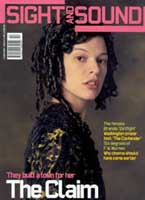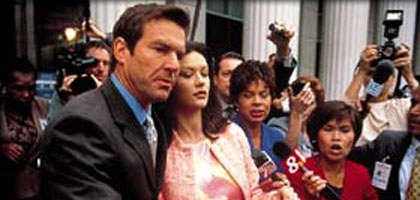
Traffic
USA 2000

Reviewed by Andrew O'Hehir
Synopsis
Our synopses give away the plot in full, including surprise twists.
While arresting drug runners near the US-Mexican border, Tijuana policemen Javier Rodriguez (Benicio Del Toro) and Manolo Sanchez (Jacob Vargas) become involved with the National Drug Force, a unit commanded by General Salazar (Tomas Milian). Salazar instructs them to locate Francisco Flores (Clifton Collins Jr), a hit man who works for a local drugs cartel which the general is determined to smash. In San Diego, Gordon (Don Cheadle) and Castro (Luis Guzmán), members of the US Drug Enforcement Agency, arrest Ruiz (Miguel Ferrer), a mid-ranking member of the same Tijuana cartel, which is run by the Obregon brothers. Ruiz agrees to give evidence against Carlos Ayala (Steven Bauer), a major Obregon trafficker in San Diego. Rodriguez and Sanchez find Flores in San Diego and drive him to Salazar's base where he discloses the addresses of key members of the Obregon cartel.
With her husband in custody, Helena Ayala (Catherine Zeta-Jones) is shadowed by the DEA and the Obregons, who demand money that Carlos owes them. Meanwhile, newly appointed US drug czar Robert Wakefield (Michael Douglas) finds out about his daughter Caroline's (Erika Christensen) drug problem. In Tijuana, Helena strikes a deal with the Obregon cartel to have Ruiz killed and Carlos' debt wiped out. Flores botches the hit on Ruiz, inadvertently killing Castro before being shot dead by a hit man. Rodriguez and Sanchez discover that Madrigal (Joel Torres), a member of the Juarez cartel, chief rival to the Obregons, who was believed dead, is alive in Mexico City and that Salazar works for the Juarez cartel. While Wakefield establishes cross-border links with Salazar, Caroline's drug problems worsen and she runs away from home. Salazar finds out that Sanchez is selling information to the DEA and has him executed. Rodriguez then passes on his knowledge about Salazar and the Obregon cartel to the Americans. With Salazar's criminal links exposed, he is murdered. Wakefield tracks Caroline down and brings her home. Ruiz is poisoned before he can testify; Carlos goes free. Wakefield resigns his post. At a party celebrating Carlos' release, Gordon forces his way into the Ayala household where he plants a surveillance device.
Review
Although its vigorous, unjaded rush of imagery and story makes for an exciting visual experience, Steven Soderbergh's Traffic is in the end a fatally sober film about drugs. For all the washed-out yellows of the film's Mexican desert and the midnight blues of its American Midwest, Traffic is a conventional cops-and-robbers melodrama, uniform in narrative texture, moralistic in tone and only intermittently in contact with the pleasure principle. None of this needs interfere with most viewers' enjoyment, and this adaptation (by Stephen Gaghan) of the Channel 4 series Traffik may be the most rousing Hollywood film about the drug trade since The French Connection.
Given the extravagant claims made for Soderbergh by many American critics, the comparison between Traffic and William Friedkin's genre-defining 1971 classic is instructive. Both films are innovative, at least in a limited, stylistic sense; The French Connection most notably for its extended car-chase scene and Traffic for its dizzying hopscotch from one plotline to another and its urgent-seeming, quasi-documentary handheld camerawork. But Traffic is, if anything, less cynical or amoral in its vision than Friedkin's film. Its fictional universe seems to be one in which virtue is rewarded (or at least nobly sacrificed) and wickedness is punished. One gets the sense that Soderbergh and Gaghan want to see a tragic ambiguity in all their characters. But only the sad and soulful Benicio Del Toro as Rodriguez, the Tijuana cop forced to negotiate a series of unacceptable bargains, ever fully escapes the pasteboard action-film motivations supplied by the script.
The ironies and contradictions of Traffic are driven home with deadly earnest hammer blows. When Michael Douglas, as drug czar Bob Wakefield, bellies up to the bar amid a discussion with several (actual) US senators about the progress of the drug war, he asks loudly for a Scotch and soda. We can read Wakefield the moment we meet him; he is well meaning but compromised, an inattentive, borderline-alcoholic dad who must venture into terrifying neighbourhoods full of dark-skinned people to retrieve his daughter, like the father George C. Scott played in Paul Schrader's Hardcore (1978). Still, he's a more convincing character than his Mexican counterpart Salazar, a comically nefarious Third World caricature who all but twirls his moustache gleefully while pronouncing that addicts provide their own "treatment" by overdosing.
As Wakefield's dopehead daughter, Erika Christensen is a junior Botticelli angel who weeps for joy the first time she smokes freebase cocaine. Like the semi-tropical vegetation found throughout this film – in Southern California, Mexico City, Ohio in midsummer – she seems a symbol of lush and uncontrollable decadence, eager to escape from the restrictions of her story. But her abrupt descent into naked depravity (as represented by sex with black men), like the depiction of her high-school drug pals as dank-skinned, repellent characters, is tinged with the persistent odour of didacticism. Not for the first or last time in Traffic, one feels the presence of a finger-wagging adult, assuring us that just because the drug war is a failure doesn't mean we should rush out and do whatever crazy thing we want.
In the 90s, the drug trade and the drug experience played prominent roles in films by the likes of Quentin Tarantino, Darren Aronofsky and P. T. Anderson. Here, Soderbergh demonstrates that he's closer to the Dickensian moralising of mid-80s Oliver Stone than to any of them. Whatever their various flaws, those directors have sought to appreciate drug-altered consciousness as a libidinal field in which id and ego, Eros and Thanatos, come to grips with one another. Acting as his own cinematographer, Soderbergh resists any such attempt to capture subjective experience, sticking to ‘naturalistic' point-of-view shots. This is a legitimate aesthetic choice and creates some striking moments, but considering the subject matter of Traffic it ultimately seems limited. Except for Javier, Soderbergh's characters are insufficient to lend the film human depth, and the result is a flashy entertainment that can only offer frustrating glimpses of the currents of psychology and desire far below its surface.
Credits
- Director
- Steven Soderbergh
- Producers
- Edward Zwick
- Marshall Herskovitz
- Laura Bickford
- Screenplay
- Stephen Gaghan
- Director of Photography
- Peter Andrews
- [i.e. Steven Soderbergh]
- Editor
- Stephen Mirrione
- Production Designer
- Philip Messina
- Music
- Cliff Martinez
Based on Traffik created by Simon Moore, originally produced by Carnival Films for Channel 4 Television
